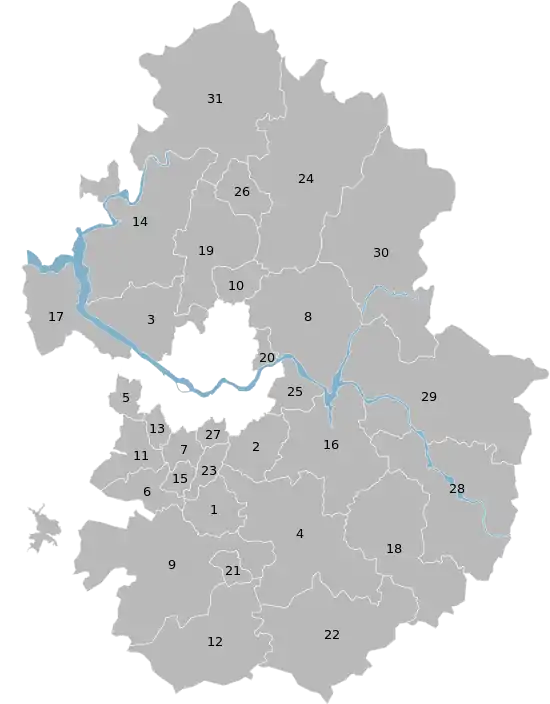North Gyeonggi Province
Gyeonggibuk-do (Hangul: 경기북도, Korean pronunciation: [kjʌŋ.ɡi.buk.do]) is a proposed province in South Korea that would span the contiguous area of Northern Gyeonggi Province, Its name, Gyeonggi means "the area surrounding capital". Thus Gyeonggi-do can be translated as "province surrounding Seoul". Northern Gyeonggi Province is the portion of the South Korean Gyeonggi Province north of the Han River and Bukhan River.
Gyeonggibuk-do
경기북도 | |
|---|---|
| Korean transcription(s) | |
| • Hangul | 경기북도 |
| • Hanja | 京畿北道 |
| • Revised Romanization | Gyeonggibuk-do |
| • McCune‑Reischauer | Kyŏnggibukdo |
| Coordinates: 37°45′N 127°02′E | |
| Country | South Korea |
| Region | Sudogwon |
| Capital | Uijeongbu |
| Subdivisions | 8 cities; 2 counties |
| Area | |
| • Total | 4,266 km2 (1,647 sq mi) |
| Area rank | 10th |
| Population (January, 2019) | |
| • Total | 3,401,994 |
| • Rank | 2nd |
| • Density | 797.5/km2 (2,066/sq mi) |
| Metropolitan Symbols | |
| • Flower | Forsythia |
| • Tree | Ginkgo |
| • Bird | Dove |
| ISO 3166 code | KR-41 |
| Dialect | Gyeonggi |
Geography
Nature and national parks
In North Gyeonggi-do, there is Bukhansan National Park in Uijeongbu. For provincial parks, there are the Chukryeongsan Natural Recreation Area, Gapyeong Yeoninsan Provincial Park. Besides the listed, the scenery of well-known mountains including Soyosan of Dongducheon City, Yongmunsan of Gapyeong County, along with Hangang and Imjingang are famous tourism sites of Gyeonggi-do.
Population
Northern Gyeonggi-do has shown a rapid increase in population due to the modernization and urbanization of the Republic of Korea.
Administrative area
Northern Gyeonggi Province would consist of 8 cities (Specific: 2, normal: 6) and two counties.[1] This is because many counties were elevated to city status owing to the influence of Seoul's new town development plan. Special cities are especially concentrated in the southern area of Gyeonggi-do.
Listed below is each entity's name in English, Hangul and Hanja.
| Map | # | Name | Hangul | Hanja | Population (2015.5)[2] | Subdivisions |
|---|---|---|---|---|---|---|
 | ||||||
| — Specific City — | ||||||
| 3 | Goyang | 고양시 | 高陽市 | 972,797 | 3 ilban-gu — 46 haengjeong-dong | |
| 8 | Namyangju | 남양주시 | 南楊州市 | 640,579 | 5 eup, 4 myeon, 7 haengjeong-dong | |
| — City — | ||||||
| 10 | Uijeongbu | 의정부시 | 議政府市 | 431,149 | 15 haengjeong-dong | |
| 14 | Paju | 파주시 | 坡州市 | 416,439 | 4 eup, 9 myeon, 7 haengjeong-dong | |
| 19 | Yangju | 양주시 | 楊州市 | 203,519 | 1 eup, 4 myeon, 6 haengjeong-dong | |
| 20 | Guri | 구리시 | 九里市 | 186,611 | 8 haengjeong-dong | |
| 24 | Pocheon | 포천시 | 抱川市 | 155,629 | 1 eup, 11 myeon, 2 haengjeong-dong | |
| 26 | Dongducheon | 동두천시 | 東豆川市 | 97,407 | 8 haengjeong-dong | |
| — County — | ||||||
| 30 | Gapyeong | 가평군 | 加平郡 | 61,403 | 1 eup, 5 myeon | |
| 31 | Yeoncheon | 연천군 | 漣川郡 | 45,314 | 2 eup, 8 myeon | |
Claimed
Transportation
Road
The road pavement rate throughout the province averages 86.5 percent. The area has access to many of South Korea's expressways, including
- No. 29 Sejong–Pocheon Expressway
- No. 60 Seoul–Yangyang Expressway, Seoul–Chuncheon
- No. 100 Seoul Ring Expressway
- No. 130 Incheon International Airport Expressway, Incheon International Airport–Seoul
Private
- Daejin University, College of Medicine Pochon CHA University, Korea Aerospace University, Shinhan University, Joongbu University, Dongyang University
Culture
Historical landmarks
Gyeonggi-do has long been a capital area, leaving many historic relics and ruins. For royal tombs (called reung), there are Donggureung of Guri, and Gwangreung, Hongreung and Yureung of Namyangju. For castles (called seong), there are Suwon Hwaseong, which is designated as the World Cultural Heritage, Haengjusanseong.
Performing arts
There are also sightseeing opportunities at Jangheung Art Park, Publication Art Complex at Heyri, Paju.
Heyri Art Valley
Heyri Art Valley is Korea's largest art town. Various Korean artists constructed the cultural town of Heyri and it features several art galleries and museums. There are about 40 museums, exhibitions, concert halls and bookstores.
Religion in Gyeonggi-do (2005)[3]
According to the census of 2005, of the people of Gyeonggi-do 34.3% follow Christianity (21.9% Protestantism and 12.4% Catholicism) and 16.8% follow Buddhism.[3] 51.1% of the population is mostly not religious or follow Islam or indigenous religions.
Football
Tourism
Entertainment
- Hallyuworld theme park, which is based on the ‘Korean Fever’, is under construction in Goyang
Proposal to create North Gyeonggi Province
In May 2017, 12 assemblymen sponsored "경기북도 설치 등에 관한 법률안".[4]
References
- "Administrative Map". Gyeonggi Province. Archived from the original on 20 April 2015. Retrieved 22 March 2013.
- "Population". Gyeonggi Province. Archived from the original on 3 March 2011. Retrieved 22 March 2013.
- 2005 Census - Religion Results Archived 2015-09-04 at the Wayback Machine